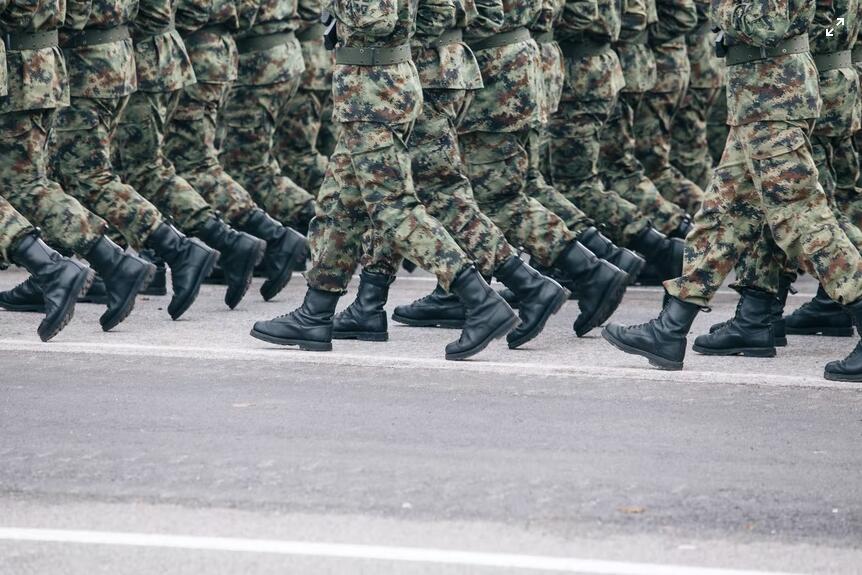Are You Eligible to Join the Military with Flat Feet?
Can You Join the Army with Flat Feet? If so, you may be wondering if you’ll be able to join. Luckily, having flat feet doesn’t automatically disqualify you from joining the armed forces. The key is to determine if your condition can be treated and accommodated by the military’s medical standards.
In this article, we’ll discuss whether or not flat feet will prevent you from joining the military and what steps you must take in order to get into war school with a flattened arch. We’ll also provide some other considerations that might impact your ability to serve as a soldier.
What is Flat Feet?
Flat feet is a condition that causes the arch of your foot to collapse, resulting in an increased angle between your heel and forefoot. This can result in pain and discomfort as well as difficulty walking at times. Flat feet can be present from birth or develop later in life, and it affects men and women equally (it’s more common in children).
What Are the Requirements for Military Service for People with Flat Feet?

Despite what you may have heard, flat feet are not a disqualification for military service. Flat feet are not a reason to fail the physical or medical exam. And they’re certainly not a reason to fail the MEPS (military entrance processing system) or when enlisting in the US Armed Forces.
What Are Military Service Requirements?
If you’ve read through this article and still aren’t sure whether or not your flat feet will prevent you from joining the armed forces, here’s some good news: it won’t! The Department of Defense has stringent physical fitness standards that all applicants must pass before they can be accepted into any branch of the military—and by passing these requirements, we mean doing really well on them. But while many who apply with flat feet may have more difficulty meeting these standards than others with higher arches do (especially when it comes to running), it’s possible for anyone with flat feet who meets other qualifications like age limits and education levels as well as mental health/accident/drug test results can serve their country even if they don’t meet this one specific requirement.
What is the role of the Military Entrance Processing Station (MEPS)?
MEPS is a military processing station. It is responsible for processing applicants for military service and conducting medical examinations on those applicants. MEPS also processes recruits who have enlisted in the armed forces, as well as members of the reserves who are called up during times of war or other conflicts.
What are the MEPS standards for flat feet?
If you have flat feet and want to join the military, there are a few things to keep in mind. First, while flat feet are disqualifying conditions for military service, they can be treated if they’re caused by an underlying condition such as an arch collapse. In these cases, your doctor may recommend orthotics or surgery.
Another option is lifestyle changes like physical therapy or massage therapy that can help improve your foot function and reduce pain caused by flat feet. These treatments typically don’t require any medications or surgery and can often go a long way toward improving the appearance of your feet without interfering with daily activities like walking or running.
How Does Flat Foot Affect Your Job in The Military?
So, what does the military have to say about flat feet? According to them, flat feet can cause pain. This is not a surprise because most people experience some level of pain from their flat feet. Pain makes it difficult for your body to perform physical tasks that require strength and endurance like running, jumping or marching. Pain in the lower back area can also be caused by flat feet since they can make it harder for you to stand upright and walk in an upright position which will put pressure on your spine causing discomfort in the lower back area.
The military has requirements that you need to meet before being able to join the service; one of these requirements is being physically fit enough so that you may be able to pass all kinds of tests while undergoing basic training as well as during field exercises or combat missions where physical fitness plays a vital role in ensuring your safety and survival amongst other things related with survival such as being able to carry heavy loads without feeling tired easily from carrying them around all day long every day until graduation day when they graduate out into active duty status (or reserve status).
How the Military Defines Flat Feet
On the surface, flat feet don’t seem like they’d be such a big deal for military applicants. After all, if you’ve got them as an adult, then you must have been born with them—and that’s not something that can be fixed.
But this isn’t necessarily true. Flat feet are defined by the condition where the arch of your foot collapses or drops while walking or standing. It’s possible to fix this problem with orthotics and other inserts in your shoes or boots that help support your arches better than normal shoes do on their own. And if done correctly, these inserts may even reduce pain in your ankles and knees caused by flat feet over time!
Developmental Flat Feet
If you have flat feet and are wondering if you’re eligible to join the military, your best bet is to consult with a board-certified foot and ankle surgeon. They will be able to evaluate your condition and give an opinion on whether or not it’s too severe for military service.
Generally speaking, developmental flat feet are less severe than acquired flat feet. As such, they may be treatable through simple orthotics (shoe inserts) or surgery—but not necessarily both at once. The severity of your condition will determine what kind of treatment option is best for you.
Temporary Flat Feet
If you have temporary flat feet, it may be possible for you to join the military. This is true even if you have had surgery to correct your condition, as long as the injury or illness which caused your flat feet has resolved and doesn’t affect your ability to walk properly.
If you have any sort of foot pain or discomfort, whether it’s because of an injury or illness that caused damage to some area of your foot webbing, or if it’s due to a congenital issue like pes planus (flat feet), talk with a doctor about what treatment options are available. In some cases, physical therapy may be all that’s needed; in others, surgery may be necessary.
Treatment Options for Military Members with Flat Feet
Here are some common treatment options for military members with flat feet:
- Orthotics can be used to help control the abnormal angle or position of your foot. They’re inserts that fit into your shoes, and they’ll keep your foot from rolling inward or outward when walking. You can get orthotics from a podiatrist (foot doctor), customizing them to fit in the shoe and insoles that you wear most often.
- Inserts help to even out the pressure on different parts of your foot, making it easier for you to walk without pain.
- Night splints are worn at night while sleeping, usually after an initial period of restorative therapy like physical therapy so that the muscles in your lower leg strengthen and become more flexible again over time before transitioning into something else like this device which keeps them stretched out while asleep so they don’t tighten up again by morningtime when all those muscles need rest!
Are There Waivers For Flat Feet?
In some cases, you may be able to get a waiver for flat feet if you can prove that your condition is severe enough to warrant exemption. If you have flat feet and are interested in enlisting, talk with a recruiter about the possibility of getting a waiver.
Waiver requests are not guaranteed, however; they’re only considered on a case-by-case basis and require documentation from your doctor or podiatrist to support them. Even if you receive a medical waiver for flat feet, it doesn’t mean that you’ll automatically be approved to serve in your desired role or position—it just means that the military agrees that it won’t cause problems during basic training or regular duties.
How can podiatrists help with my military application?
If your application to the military has been rejected due to flat feet, a podiatrist can help.
In many cases, a consultation with a podiatrist can provide the necessary documentation that will support your application. Your doctor may be able to show that you are on the road to recovery and have already made significant progress in reducing or eliminating any pain associated with flat feet.
If necessary, doctors will often be able to provide treatment for patients before they apply for enlistment in order to help them meet the requirements needed by each specific service branch.
Can You Join the Army with Flat Feet?
You can join the Army with flat feet, but you need to meet certain standards and have a waiver. You’ll also need to go through a thorough physical examination, including an X-ray. If you want to join the Army and have flat feet, here’s what you need to know:
- You can’t be overweight for your height (which is about 20% of recruits).
- You must be between ages 17 and 34 in order to enlist in this branch of service.
- You’ll need to pass a background investigation conducted by someone from Military Entrance Processing Command (MEPCOM) before they decide whether or not they will allow you into basic training as well as beyond that point if necessary based upon the results gathered during their initial investigation process which includes any criminal history concerns related specifically towards those convicted under federal law since October 31st 2011 after being released into society once again following incarceration periods served out during those time frames mentioned above (October 31st 2011).
Can you join the Air Force with flat feet?
You can join the Air Force with flat feet. In fact, you must have a negative military profile (MP) in order to be eligible for enlistment as an Airman.
If you’ve been told that your feet are too flat and therefore ineligible for service, don’t let it get you down! There are lots of jobs that require a negative MP and we’ll go through some of them here.
The first thing to keep in mind is that just because someone else has gotten into the military with flat feet doesn’t mean it’s going to happen for everyone. If a recruiter tells you otherwise, tell them about this article—it will help them understand how things work inside AFPC and reassure any young person who is worried about having their dream career dashed by an annoying physical condition like being born with floppy toes or whatever else makes them “unfit” according to current standards set forth by [insert name here].
Is there a way to join the Marine Corps with flat feet?
Yes, you can join the Marine Corps with flat feet. However, you must meet certain requirements to qualify for this position.
- Marines must pass a physical fitness test that includes pull-ups and sit-ups before they can enroll into boot camp.
- Marines must also pass the physical requirements of their job in order to be eligible for it.
While the Navy does have a waiver for flat feet, it is not easy to get. You need to be diagnosed with flat feet by a doctor and have had the condition for at least one year before you can apply.
The Navy will also consider active duty applicants who have been treated for their flat feet and are able to pass all physical requirements with normal arch supports or orthotics.
Can you join the coast guard with flat feet?
The answer is yes, you can join the Coast Guard with flat feet. You will need to get a waiver if you are medically cleared for the Coast Guard by your doctor, though. The waiver process may take up to 6 months or so and it involves going to MEPS in order to get evaluted.
How to get a waiver for flat feet when joining the military.
In order to be eligible for a flat feet waiver, most military branches require you to meet the following requirements:
- Be at least 17 years old.
- Meet the minimum ASVAB score. This can vary by branch, but will generally be around 50 in some cases and as high as 90 in others. The ASVAB is a test that assesses your ability in several categories including mathematical reasoning and mechanical knowledge.
- Meet the minimum education level required for your desired position within the military branch you wish to join (for example, if you want to join an Army aviation unit then high school diploma would suffice).
- Pass basic physical fitness standards (that are different depending on which service branch you choose). Physical fitness tests include push-ups and sit-ups, pull ups or curl ups (these can also vary depending on which service branch), along with running 1 mile within a certain amount of time depending on age group (younger age groups get less time than older ones) as well as shuttle run times based on age group too! These standards may change over time so check here before applying!
The military will accept recruits with flat feet if they comply with these regulations.
If you have flat feet and are interested in joining the military, there are a few things you need to know. The first thing is that the military will accept recruits with flat feet if they comply with these regulations:
- You must be able to pass the physical fitness test. This includes push-ups, sit-ups, and running for distance.
- You must be able to pass the Army Physical Fitness Test (APFT). The APFT consists of three events: two minutes of push-ups; two minutes of sit-ups; and a two mile run on a track or course with no obstacles.
- If you are planning on joining any branch besides the Marine Corps or Navy, it’s also important that you’re physically fit enough to complete your service’s basic training program (also known as boot camp) without being held back due to medical reasons such as poor conditioning or injuries sustained during training exercises because these things could affect your career within our military
There are three ways to be considered eligible.
There are three ways to be considered eligible: no history of flat feet, flat feet that are not severe enough to cause problems during physical training, or flat feet that can be corrected with surgery.
The military will consider your condition after you take the Armed Forces Qualification Test (AFQT) and score well enough on it. If you score high enough, they will allow you into the military even if they are unsure whether your flat feet would be a problem while in service. The decision is ultimately up to them; there is no appeal process available if they say no!
If this doesn’t work out for any reason—if you fail the AFQT or don’t like being told what to do—there is another option: applying for a medical waiver. A waiver allows people with conditions normally disqualifying them from entering service into the military anyway. However, getting such a waiver requires documentation from a doctor saying that their condition won’t hinder their ability to serve safely and effectively under specific circumstances; these circumstances vary depending on which branch of service one is applying for (Army vs Navy).
Conclusion
If you have flat feet and are interested in joining the military, you may be able to join if you meet these requirements.







